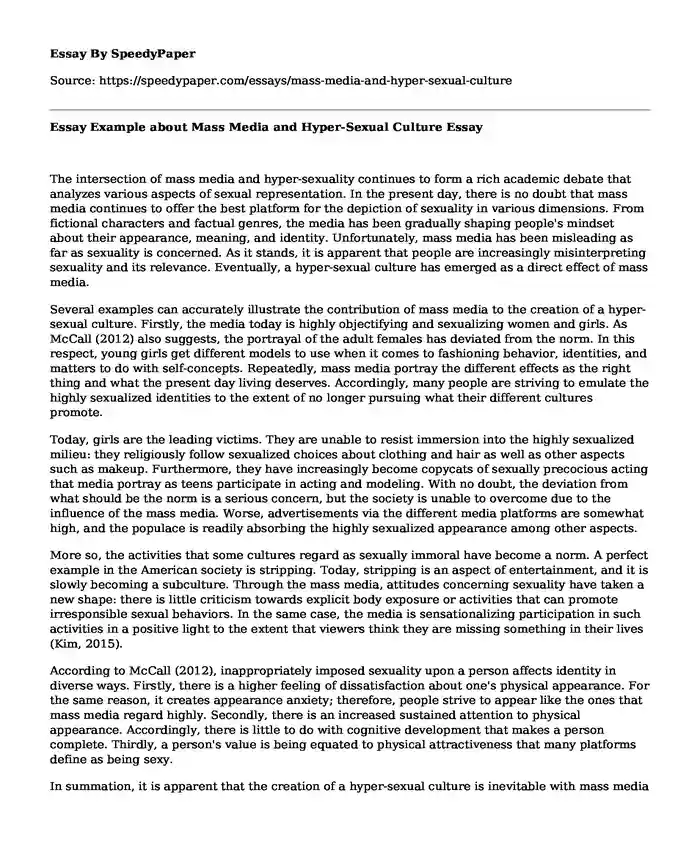
| Type of paper: | Essay |
| Categories: | Media Human sexuality |
| Pages: | 3 |
| Wordcount: | 651 words |
The intersection of mass media and hyper-sexuality continues to form a rich academic debate that analyzes various aspects of sexual representation. In the present day, there is no doubt that mass media continues to offer the best platform for the depiction of sexuality in various dimensions. From fictional characters and factual genres, the media has been gradually shaping people's mindset about their appearance, meaning, and identity. Unfortunately, mass media has been misleading as far as sexuality is concerned. As it stands, it is apparent that people are increasingly misinterpreting sexuality and its relevance. Eventually, a hyper-sexual culture has emerged as a direct effect of mass media.
Several examples can accurately illustrate the contribution of mass media to the creation of a hyper-sexual culture. Firstly, the media today is highly objectifying and sexualizing women and girls. As McCall (2012) also suggests, the portrayal of the adult females has deviated from the norm. In this respect, young girls get different models to use when it comes to fashioning behavior, identities, and matters to do with self-concepts. Repeatedly, mass media portray the different effects as the right thing and what the present day living deserves. Accordingly, many people are striving to emulate the highly sexualized identities to the extent of no longer pursuing what their different cultures promote.
Today, girls are the leading victims. They are unable to resist immersion into the highly sexualized milieu: they religiously follow sexualized choices about clothing and hair as well as other aspects such as makeup. Furthermore, they have increasingly become copycats of sexually precocious acting that media portray as teens participate in acting and modeling. With no doubt, the deviation from what should be the norm is a serious concern, but the society is unable to overcome due to the influence of the mass media. Worse, advertisements via the different media platforms are somewhat high, and the populace is readily absorbing the highly sexualized appearance among other aspects.
More so, the activities that some cultures regard as sexually immoral have become a norm. A perfect example in the American society is stripping. Today, stripping is an aspect of entertainment, and it is slowly becoming a subculture. Through the mass media, attitudes concerning sexuality have taken a new shape: there is little criticism towards explicit body exposure or activities that can promote irresponsible sexual behaviors. In the same case, the media is sensationalizing participation in such activities in a positive light to the extent that viewers think they are missing something in their lives (Kim, 2015).
According to McCall (2012), inappropriately imposed sexuality upon a person affects identity in diverse ways. Firstly, there is a higher feeling of dissatisfaction about one's physical appearance. For the same reason, it creates appearance anxiety; therefore, people strive to appear like the ones that mass media regard highly. Secondly, there is an increased sustained attention to physical appearance. Accordingly, there is little to do with cognitive development that makes a person complete. Thirdly, a person's value is being equated to physical attractiveness that many platforms define as being sexy.
In summation, it is apparent that the creation of a hyper-sexual culture is inevitable with mass media being in control as it is the case today. Despite what the society may interpret as right or wrong, a person's value is gradually changing to stand for sexualized appearance. As a result, appearance comes before other aspects, and it is justified to deduce that sexuality is inappropriately being imposed. As analyzed above, girls and young women are the leading victims considering that sexualized choices about hair and clothing among other aspects usually target the female gender. As it stands, it is judicious to presume that the impacts will be more profound over time due to the increased sexual objectification via the mass media.
References
McCall, C. (2012). The Sexualization of Women and Girls. N.p.: Psychology Today.
Kim, Y. (2015). Threatening hypersexual culture numbs American society. [online]. Coyote Chronicle.
Cite this page
Essay Example about Mass Media and Hyper-Sexual Culture. (2022, Sep 22). Retrieved from https://speedypaper.com/essays/mass-media-and-hyper-sexual-culture
Request Removal
If you are the original author of this essay and no longer wish to have it published on the SpeedyPaper website, please click below to request its removal:
- Lateral Torsional Buckling - Free Essay in Engineering
- Essay Example on Clinical Guidelines for Health Promotion
- Free Essay on Recovering From Drugs Abuse
- Aunt Emma's Letters - Personal Experience Essay Sample
- Essay Sample on the Transformation of the UAE in the Last Two Decades
- Free Essay Example: Analysis of Dax's Case
- Paper Example: Life after Traumatic Brain Injury
Popular categories




